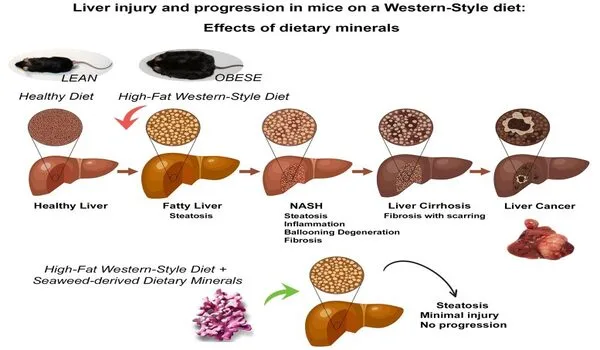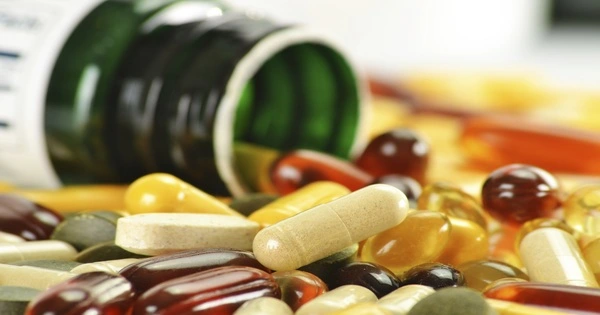Mice fed a high-fat diet with calcium and magnesium supplements did not develop liver cancer.
A preclinical study adds to the growing body of data suggesting a multi-mineral dietary supplement called Aquamin may be a simple and effective strategy to minimize the long-term health effects of non-alcoholic fatty liver disease. Aquamin is a calcified red marine algae supplement that contains calcium, magnesium, and 72 other minerals and trace elements.
Non-alcoholic fatty liver disease, which is defined by an excess of fat accumulated in the liver, affects about 25% of adults in the United States. Non-alcoholic steatohepatitis (NASH) is a more aggressive version of this illness that causes the liver to become inflamed. Fibrosis, advanced scarring known as cirrhosis, liver failure, and cancer can all result from this.
Non-alcoholic fatty liver disease is a rising public health problem that is now being addressed by focusing on lifestyle changes, particularly food, to prevent fat build-up in the liver, said Muhammad Nadeem Aslam, MD, of the University of Michigan in Ann Arbor, who led the research team. “We need new approaches since this does not work for everyone.”
The new discovery will be presented at the American Society for Investigative Pathology annual meeting, which will be held April 2–5 in Philadelphia, by Isabelle Harber, an undergraduate researcher in Aslam’s group.
“The majority of people in Western civilization do not reach the USDA daily intake standards for calcium and magnesium, as well as, probably, additional minerals nutritionally related to these minerals,” Harber added. “We’re looking at whether a mineral supplement could be a low-cost, low-to-no-toxicity way of reducing the devastating effects of non-alcoholic fatty liver disease.”

In preliminary trials, the researchers fed mice a high-fat diet to generate non-alcoholic fatty liver disease, or NASH, in mice. They saw the complete spectrum of liver illness in these animals for 15 to 18 months, including advanced fibrotic alterations and liver cancer.
These investigations found that when animals were fed a high-fat diet and given a multi-mineral supplement, the late-stage effects of NASH were significantly reduced compared to animals that were not given the supplement. The researchers detected protein alterations related to NASH in short-term tests lasting about 24 weeks, while tumor development was suppressed in lengthier experiments.
“Most people living in Western society do not meet the USDA daily intake guidelines for the intake of calcium and magnesium and, presumably, other minerals nutritionally associated with these minerals, We are working to find out if a mineral supplement could provide a low-cost, low- to no-toxicity approach to mitigating the devastated consequences of non-alcoholic fatty liver disease.”
said Harber.
In the long-term tests, we found that most mice on the high-fat diet had massive liver tumors, but animals on the same diet that took the mineral supplement developed no tumors, Aslam added. “These findings back up our earlier findings that minerals have the potential to alleviate the negative effects of fatty liver disease.”
Because the short-and long-term studies used different types of mice, the researchers hope to do both sets of experiments on the same animals in the future. This will enable them to detect early protein changes in individual animals that may predict or be linked to protection from later repercussions.
They just completed a 90-day pilot phase experiment in 30 healthy colorectal cancer patients who were randomly assigned to Aquamin or a placebo. The trial revealed that the mineral supplement was safe and tolerable, with no evidence of potential liver harm. They’re also initiating preliminary clinical tests to see how safe and tolerable Aquamin is over the course of 180 days. The study’s goals will include signs of liver injury and inflammation.
Isabelle Harber will present this research on Sunday, April 3 from 11:45 a.m.–12:45 p.m. in Exhibit/Poster Hall A-B, Pennsylvania Convention Center (Poster Board Number D20) (abstract) and at 6 p.m. on Terrace 2/3, Pennsylvania Convention Center (abstract) (abstract). For additional information or to get a complimentary press ticket to attend the meeting, contact the media team.
Meeting: Experimental Biology 2022





